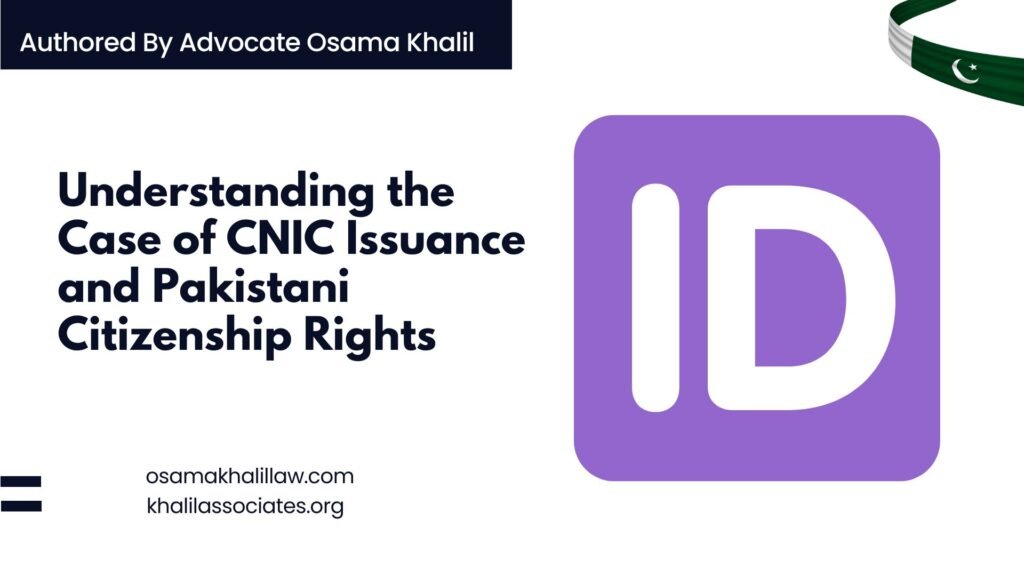
In September 2023, the Balochistan High Court made a decision that affects every Pakistani citizen. The case involved CNIC issuance rights, where a group of people claimed they could not get their Computerized National Identity Cards (CNICs) despite proving they were Pakistani citizens. The petitioners had lived in Pakistan for generations and possessed documents confirming their citizenship. However, NADRA, the government body responsible for issuing CNICs, refused to issue them. The court’s decision now provides clear instructions about CNIC issuance rights for citizens.
This case demonstrates that when people hold legal documents proving their citizenship, they should not face rejection for their CNIC. The court’s ruling helps clarify how citizens can resolve similar issues with their CNICs.
The Background: Why Was the CNIC Denied?
The petitioners, DAD MUHAMMAD and his family, clearly proved they were Pakistani citizens. They owned land in Quetta, and their ancestors had owned this land since the 1960s. Despite presenting official documents from the 1960s and 1970s, NADRA denied their requests for CNICs. The petitioners approached NADRA several times, but NADRA rejected their applications each time.
NADRA based its refusal on the claim that their documents lacked validity. However, the petitioners had strong evidence that their family had been part of Pakistan for generations. They also provided documents from before 1979, a requirement for CNIC issuance. The petitioners decided to take legal action to protect their rights.
Legal Rights Behind CNIC Issuance
The court made its decision based on several laws, such as the National Database and Registration Authority Ordinance and the Specific Relief Act. These laws outline who can receive a CNIC and the conditions for obtaining it. In 2017, the government issued a notification stating that anyone who can prove their connection to Pakistan with documents from before 1979 should be eligible to receive a CNIC.
This notification was crucial to the petitioners’ case. The petitioners provided documents dating back to 1965, showing their ancestors’ long-standing connection to Pakistan. According to the law, the petitioners should have been eligible for CNICs. The court acknowledged this and relied on the legal framework to support the petitioners’ claims.
The Court’s Decision: Upholding CNIC Issuance Rights
The court reviewed all the evidence and ruled in favor of the petitioners. The court confirmed that the petitioners had the legal right to obtain their CNICs since they had proven they were Pakistani citizens. The court emphasized that NADRA could not deny people their CNICs without valid reasons. The petitioners presented enough evidence to show they had been part of Pakistan for decades. According to the law, they should have received their CNICs without further delay.
This decision sent a strong message to NADRA and other government bodies: if someone presents valid documents proving their citizenship, the law requires them to issue the CNIC. The court’s ruling protects the fundamental rights of Pakistani citizens, ensuring that no one can arbitrarily lose their nationality.
Why This Case Matters to Every Pakistani
This case matters to every Pakistani because it clarifies the legal process for CNIC issuance rights. If you are a Pakistani citizen and you possess proof, such as land documents or old certificates, this case confirms that you have the right to receive a CNIC. If you face issues with NADRA, this case shows that the legal system can support you.
Additionally, the case reaffirms the importance of citizenship as a basic human right. If someone is recognized as a citizen of Pakistan, the government must issue their CNIC. The court made it clear that no one can lose their citizenship without proper legal processes. This case serves as a reminder that every citizen has the right to recognition and to receive a CNIC as proof of their nationality.
The Legal Framework for CNIC Issuance
The 2017 government notification plays a crucial role in this case. The notification states that any person who can prove their citizenship with documents from before 1979, such as land records or local certificates, should be eligible for CNIC issuance. The petitioners presented these documents and followed all the required procedures. The court ruled that NADRA must issue CNICs to people who meet these requirements, making the legal process clearer for those facing similar problems.
This case also highlights the responsibility of NADRA in verifying and issuing CNICs. NADRA must follow the laws and regulations outlined in the National Database and Registration Authority Ordinance and the government’s notifications. The court’s ruling showed that NADRA cannot deny CNIC issuance without following the legal steps. This decision ensures that people’s citizenship rights are protected.
Conclusion: The Impact of the CNIC Issuance Case
The court’s decision in this case represents a win for all Pakistani citizens. It confirms that the right to citizenship and CNICs are not privileges but fundamental rights that must remain protected. The ruling also serves as a reminder that no one should lose their CNIC without legal justification. If you can prove your citizenship with valid documents, you have the right to receive a CNIC.
This case also reminds us that Pakistan’s legal system works to protect our rights. If you face any issues with your CNIC or citizenship, you can trust that the courts will support you if you follow the legal path. The case of CNIC issuance rights sets a strong precedent, ensuring that all Pakistani citizens can obtain their CNICs and enjoy their basic rights.
Legal Assistance
For professional legal guidance and support in immigration matters, you may contact:
Mr. Osama Khalil
Lawyer & Legal Consultant
📞 Phone: 0316-1829946
📧 Email: contact@osamakhalillaw.com | contact@khalilassociates.org
